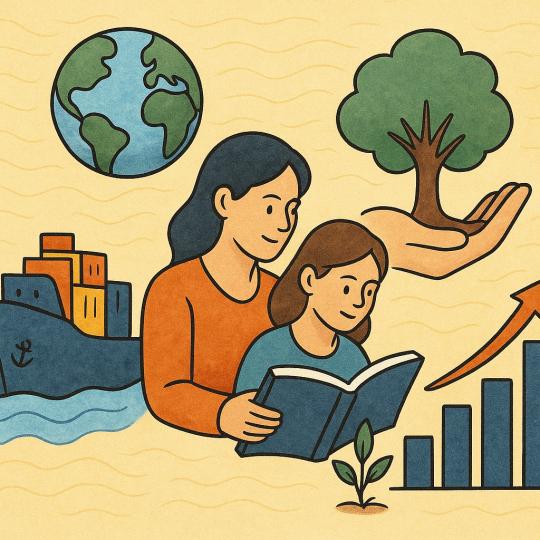Global trade promises prosperity, higher incomes, stronger connections between nations, and new opportunities for growth. But beneath the surface of economic optimism lies a tougher question: could those same forces also strain the planet and widen the gap in education? As goods, money, and ideas cross borders more freely, so too do the hidden costs, like pollution and unequal access to opportunity. A new study explores this double-edged sword and asks: can we have it all, or is something being left behind?
A recent study by CUBE researcher and Full Professor Leonor Modesto, in co-authorship with, Stéphane Bouché (Universitat de les Illes Balears) explores this pressing question by analyzing how global trade interacts with two key human behaviors: investing in children's education and protecting the environment.
Imagine two fictional countries: one with a highly educated population and another where most people lack access to quality education. The study reveals that when these two countries begin to trade freely, the poorer country sees an increase in opportunities for education. Why? Because trade changes wages and makes it easier for parents to afford schooling for their children. This is particularly meaningful in countries where families previously couldn't invest in education due to financial constraints.
But there’s a catch.
As more people gain education and incomes rise, economic activity increases, and so does pollution. The authors find that the environmental damage from higher production may outweigh the benefits of more people contributing to conservation efforts. In short, free trade alone is not enough to safeguard the environment. It helps balance education and income across countries, but without deliberate policy interventions, environmental protection lags behind.
According to Leonor Modesto, the research idea stemmed from a dual interest: analyzing the impacts of international trade while exploring how intergenerational investment decisions, particularly those with implications for future generations, are made.
“The idea emerged because we wanted to analyze the impacts of international trade while also being interested in investment decisions with intergenerational consequences. Previous studies have explored the relationship between trade and investments in education and human capital, while others have focused on trade and environmental quality. But no study, to our knowledge, has jointly addressed these two areas.” - Leonor Modesto
The Power of Altruism
This integrative approach was grounded in the recognition that both education and environmental investments are, fundamentally, motivated by altruistic concerns, particularly those of parents wishing to improve the lives of their children.

However, whether people contribute to environmental protection depends on their income level and how much they value the future. Wealthier, more educated individuals are more likely to invest in conservation. So, as formerly poor individuals get richer through trade, they may start acting more like those in wealthier countries, putting money toward conservation. Still, unless pollution control keeps pace with growth, environmental quality could decline overall.
“Parents are naturally inclined to invest in their children's education to help them succeed in the labor market, just as they might wish to leave behind a safer, cleaner environment. However, education is a private good, while the environment is a public one. This distinction changes the incentives.” - Leonor Modesto
The research emphasizes that although individuals exhibit altruistic behavior, their willingness to invest varies depending on the nature of the good. “Paying for one’s child’s education yields direct, individual benefits, whereas improving environmental quality benefits society at large, including others’ children. This makes it more difficult to mobilize sufficient private investment in environmental preservation, absent policy intervention.” - Leonor Modesto
Is There a Better Way?
The research doesn’t just highlight problems, it also proposes a solution.
The authors argue that public policy must play a catalytic role: “When it comes to public goods like the environment, individual altruism is insufficient. Political action is necessary to incentivize collective efforts, especially since people may assume that those with greater education or higher income will take the lead.” - Leonor Modesto
The study also critically reflects on the limitations of trade liberalization. While trade can equalize income and reduce educational inequality, it does not inherently promote environmental investment. Moreover, as trade stimulates economic growth and industrial production, it can exacerbate environmental degradation unless counterbalanced by policy frameworks that prioritize sustainability.
The authors suggest that governments can step in with well-designed policies setting fair prices for public goods through what economists call Lindahl pricing. At the same time, income transfers or tax adjustments can ensure the redistribution of income in a way that encourages everyone to invest in education and environmental protection.
Why It Matters
As countries debate trade deals and global cooperation, this study provides a clear message: economic policy should not just focus on profits or GDP growth. To ensure a better world for future generations, it must also consider how trade affects education access and environmental health.
The real challenge is designing policies that harness the benefits of global trade without sacrificing the planet or future opportunities. In the end, the trade-off between income equality and environmental sustainability isn’t inevitable. With thoughtful public policy, global trade can be harnessed not only to lift people out of poverty, but to do so in a way that protects the world they will inherit.
The research was developed in collaboration with Stéphane Bouché, a postdoctoral researcher supported by Portugal’s Foundation for Science and Technology (FCT) under the project Endogeneous Fluctuations (PTDC/EGE-ECO/27884/2017 ). “Stéphane joined our team in September 2019. The pandemic struck shortly after, and from early 2020 onward, we worked remotely, each from home, finalizing and co-authoring the paper during the lockdown.” - Leonor Modesto
The article was accepted in 2024 and published in 2025, having been presented at several leading conferences, including the Association of Southern European Economic Theorists (ASSET) and the Public Economic Theory (PET) conference.
You can read more about Modesto’ s work in the Journal of Economic Behavior and Organization article “Altruism, human capital and environmental preservation in a globalized economy” https://doi.org/10.1016/j.jebo.2025.106940.